There has been a reckoning in the entertainment industry as of late, a call for more representation and inclusive storytelling that has led to films like Everything Everywhere All At Once and CODA finding greater box office success than they might have had a decade ago. In the midst of cries for justice and visibility, the intentionality of creatives and their work is becoming more crucial than ever before. And this intentionality begins with the storytellers themselves – writers. What better way to examine the state of the industry than by looking at the diversity programming at the Austin Film Festival, which has been deemed…
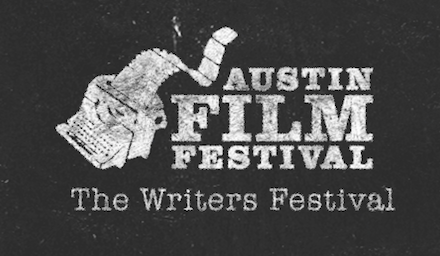
The Writers Festival
Every year at the end of October, the Austin Film Festival brings writers together for a week of films and panels, giving new storytellers a chance to learn from seasoned ones. The programmers bring in industry professionals from across the board – TV writers, producers, managers, playwrights, podcast hosts, indie filmmakers and, of course, lots of screenwriters. These experts range from staff writers with just a few years of experience under their belt to Oscar-nominated, even Oscar-winning artists. AFF is one of the few places where you can network laterally, getting acquainted with people who are just coming up at your level, and just happen to find yourself sitting in the same theater as Dustin Hoffman.
This was my eighth year attending the festival and I still have not gotten it down to a science because there is so much to keep up with over the course of the week. Due to the abundance of programing, there are often blocks where I have to decide between three different panels that I’d like to attend. A good problem to have, for sure. Thus, while I cannot give an exhaustive review of the entire event, I would like to highlight a few of the panels and films I attended that spoke to the importance of diverse storytelling.
AFF In Six Square
In partnership with the George Washington Carver Museum, the festival hosted a diversity block of sorts called AFF IN SIX SQUARE that was free and open to the public. It included a panel, a shorts program and a feature screening.
While I was heartened to see this event on the schedule, I was also somewhat disappointed by the small turnout it received – just a reminder that we still have a ways to go before there is equity in our entertainment industry.
Panel – Representation On and Off Screen
The panel that was offered as a part of this block was a conversation with Kelly Edwards and Beau DeMayo, both of whom were generous with the insight they provided about their experience working in the industry, often as one of the few BIPOC in the room. DeMayo also spoke to the intersectionality of being Black and queer and how that informs his approach to telling authentic stories.
It was a very engaging conversation and I wish more people could’ve witnessed it. Something that I have found to be true, however, is that those who show up to these events are truly passionate about the cause they’re fighting for; so while the numbers may have been small, the dialogue that was generated, both in the panel and during the Q&A afterward, was invigorating and encouraging.
Shorts Program
I had intended to leave after the panel, but decided to stick around for the shorts. And I’m so glad I did because each one was like its own little gem.
Respectfully
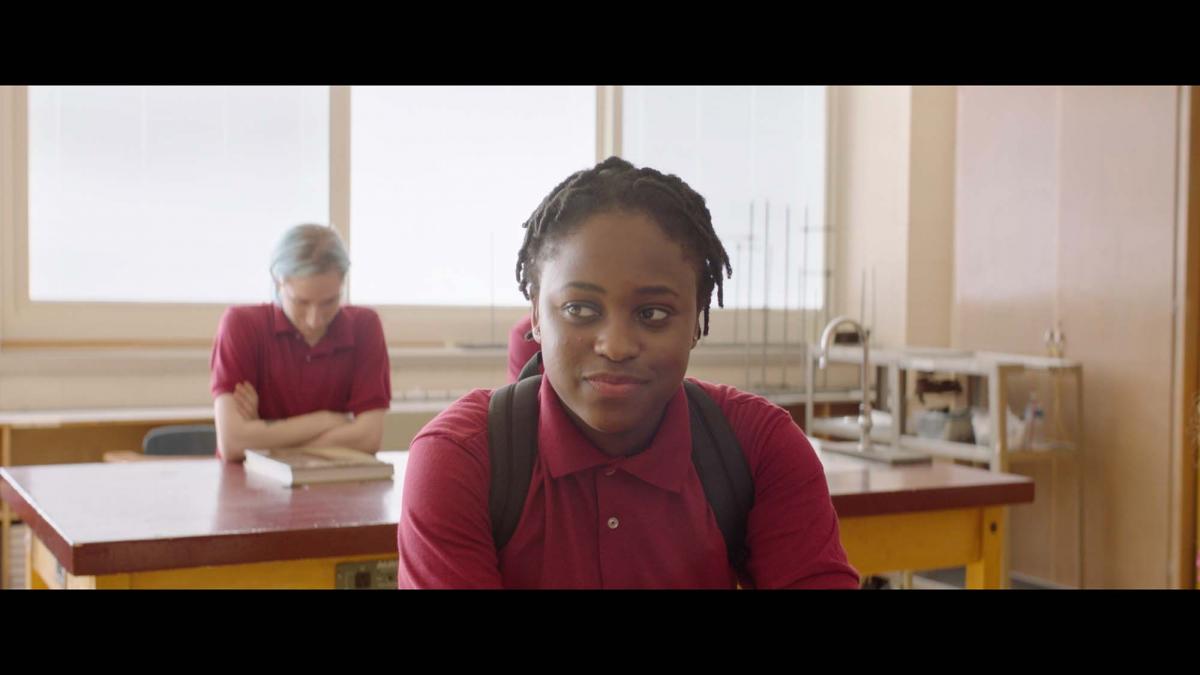
Written by C.A. Barrow and Keving Johnson and directed by Desirae Lee, Respectfully is equal parts humorous and poignant in the way it explores racial profiling in the classroom. I loved the way the filmmakers employed these guardian angels to help the protagonist navigate her teachers’ racial bias. There was a recurring theme in the story about standing up for yourself, of not making yourself small for the sake of cooperation. Respectfully.
Quilted Education

Quilted Education is a short documentary written and directed by Kayla Robinson about how her mother used quilting to teach her class about Black history. It is an incredibly timely narrative given the ongoing battle for diversity in education and was such a heartwarming true story about the impact one student’s resilience can have, especially when her mother gets involved.
The New Knight

An adorable little short written by Steven Allerick and co-directed by Carl Reid. The filmmakers blend fantasy and reality to examine the heart-wrenching experience of the first time your childhood ignorance is shattered, the first time you experience racial bias and how both the kid and the parents respond in that scenario. In the end, it’s the big brother who saves the day, allowing the little Batman to spread his wings.
New Moon
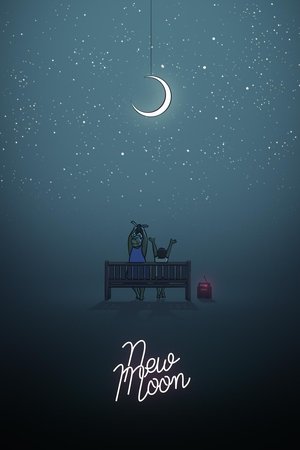
Colman Domingo co-wrote New Moon with his brother Raúl Domingo, who co-directed it with Jérémie Balais and Jeff LeBars. It is a stunningly animated tale, narrated by Colman himself, as he recounts a special evening when his mother taught him how to dream. You’re truly brought right into his world, down to the most minute details that bring the story to life.
I was reminded of the way Reading Rainbow transports you into the book as it’s being read.
Other films that featured diverse stories
Feature – Golden Delicious
What makes Golden Delicious stand out from similar queer teen dramedies is the intersectionality it explores given the Asian Canadian family at the center of the story. With the expectations and biases of Jake’s culture complicating how he understands his sexuality, it’s less a film about coming “out” and more a film about “coming into” your full self, of understanding the many facets to your identity.
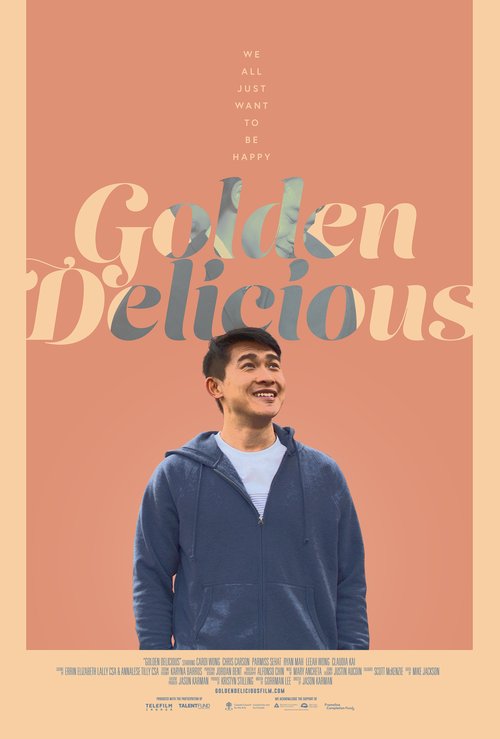
The film really leans into the dangers of toxic masculinity, particularly in how Jake’s dad behaves. We can see Jake is “softer” than his father wants him to be, that he’s trying to toughen up and be a “man.” In addition to the pressure there, we see pressure from his girlfriend, Valerie, his friends and a homophobic bully to prove his manhood by losing his virginity. While grappling with this, Jake finds himself drawn to Aleks, his new neighbor, who wears his queerness with pride. It’s clear Jake has a crush on him, but it goes beyond that – he envies Aleks’ self-confidence and wants to be around his unabashedly queer energy. But his inability to get past his own idea of masculinity causes him to make some bad moves, hurting both Valerie and Aleks in the process. In particular, Aleks represents the thing Jake is most afraid of and that causes him to be a punching bag as Jake works through his internalized homophobia. Eventually, after much introspection, Jake finally accepts himself, comes out to everyone and embraces his queerness by sporting a rainbow bowtie and meeting up with Aleks at the dance. So much of the queer journey has to do with feeling comfortable in your own skin, and wardrobe – finding your “look” – is a huge part of that. It’s wonderful to see the spring in Jake’s step as he gets ready for the dance, as he looks in the mirror and truly likes what he sees.
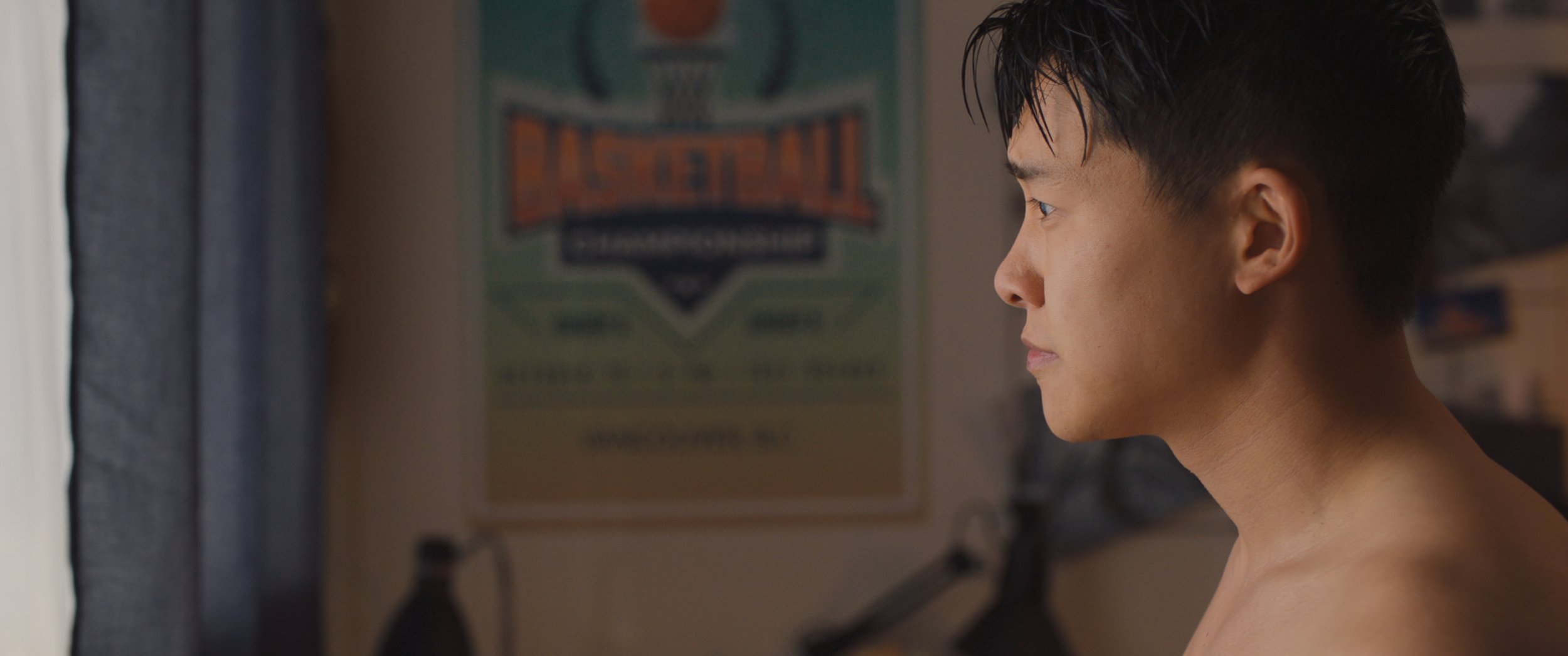
Jake may be the protagonist, but each of the supporting characters has their own arc, their own growth within the narrative. Perhaps the most intriguing player in the story is Jake’s sister, Janet. She’s introduced as a somewhat meek presence, someone who has found her passion for cooking and is the sole person who wants to continue in the family business. She knows what she wants and sticks to her guns, even when her parents both discourage her. And when Jake’s drama comes to the fore, Janet is the one who brings the family together to make things right. It was very satisfying to see her taken seriously at the end of the film, and so cathartic to watch her gain agency over the course of the story.
Short – Wuss
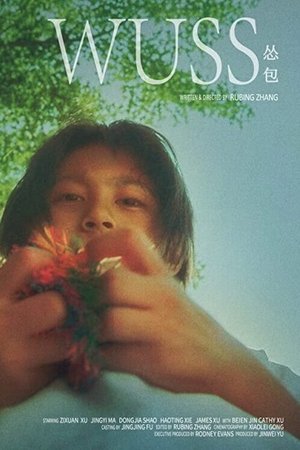
The tender exploration of gendered behaviors in Wuss is well-executed as we watch a young tomboy weigh the consequences of her desire to be “one of the boys.”
There is a lot of pressure to prove yourself when trying to fit in with a crowd you don’t quite mesh with and Rubing Zhang does a great job of showcasing the inner dilemma inherent in that scenario.
What’s wonderful about this short is that, even though the protagonist wrestles with these feelings of inadequacy, the narrative itself interrogates the way heteronormative expectations and biases that pervade our upbringings. We see this young tomboy has the capacity to be kind while also matching the zeal and energy of the group of boys she’s trying to join.
Something that is beautiful about embracing a more non-binary way of thinking is that you get to feel valid in being both gentle and tough, that the two can co-exist.
Short – Sammy, Without Strings
In many ways, this short is a callback to an era long-gone, with puppetry at its center and a black-and-white color palette to boot. But it becomes all the more poignant and timely as the story unfolds, ultimately building to an ending that is a stark reminder of how far we still have to go as a country in combatting systemic racism.

Co-written by Will Henderson III and directed by Ralph Parker III, Sammy, Without Strings follows Sammy, a Black puppet whose only life experience is performing for crowds, very much like the problematic minstrel archetype that pervaded so much of cinema in the early 20th century. But, as Sammy looks out into the crowd, he falls in love with a woman who seems to be the key to a better life – a life without strings. When he conveys his dreams to an older puppet, he is cautioned against cutting his strings. This older puppet had a similar desire to escape, but was unable to function after he had cut his own strings, and was left limp, stringless, aimless and defeated.
There’s a wistfulness to the way Sammy leans into the romance of it all, one which compels us to cheer for him and root for his happy ending. But, in the end, we find out that the woman he thought he loved is very similar to the Armitage family in Get Out in the way she just collects Black trophies. In the final shot of the film, we pan around a room filled with figurines that would be banned in this day and age – lots of Blackface, even an Aunt Jemima – until we finally arrive at a glass case where a tearful Sammy is propped up. The ending is both shocking and, unfortunately predictable, given the state of the world, and I applaud the filmmakers for making that choice.
Other panels that discussed diversity and inclusion
On Writing: Never Have I Ever

One of the most refreshing series that Netflix has produced in recent years is Never Have I Ever, a very current and racially diverse story that explores topics like grief, identity and love through the ups and downs of high school. The show was co-created by Mindy Kaling and Lang Fisher, the latter of whom gave AFF attendees the inside scoop on their approach to inclusive storytelling. The secret – diversity in the writers’ room. The show’s creative team knew there was going to be a strong emphasis on Indian culture, so they hired people who had immigrant stories, who’d lost parents, and who knew what it was like to navigate the intersectionality of being Indian-American. But they also hired some Gen Zers so that Devi’s high school resembled a typical public school, complete with all the nuances of that experience. They wanted to tell an authentic and layered story, so they made sure the room where this world was being molded reflected all of that.
(Impact) Writing Between The Lines
The fact that AFF makes space to have a panel specifically devoted to DEI content in entertainment is incredibly encouraging. And I’m happy to say this one had a pretty decent turnout in terms of attendees. I did find it ironic that a panel that spent so much time talking about being aware of your blindspots when telling niche stories was comprised solely of cis white people. Yes, one of the panelists was a woman, which does give voice to an underrepresented demographic, but I would’ve thought they’d have some more diversity in that group. There is something to be said for those with privilege and opportunity taking the time to examine how to be a better ally, so I do commend the panelists for engaging in the conversation.
However, the homogeneity onstage did prove to be a little frustrating during the Q&A, when one writer posed a question about how to navigate writing a diverse period drama when the truth of history is that a lot of spaces weren’t diverse. The responses from the panelists onstage ranged from “yeah – that’s hard, guess you gotta stick to the facts” to suggesting she pull a Once Upon a Time in Hollywood and rewrite history. All viable options, to be sure, but I was sitting there waiting for someone to mention how brilliantly the reboot of A League of Their Own handled this exact issue. To me, the answer was staring them in the face and yet no one brought it up. This is the problem with siloing your entertainment and having a lack of diversity on a panel – a queer person would’ve had the perfect answer to this question. (And yes, I did go up to the writer after the panel, and we had a great exchange about A League of Their Own as a result).
Conclusion: We’re making progress, but there’s still a ways to go
Growth takes time and I do see AFF making a real effort to diversify its programming, to speak to the reckoning the industry is going through and be a champion for underrepresented voices. Offering films and panels that provide a space for these conversations is a great first step in that process. Now, we just need to get more people attending these conversations and consuming these other stories! It’s an ongoing challenge, but if the offerings of the diversity programming at this year’s festival are any indication, AFF is up to the task.

Comments